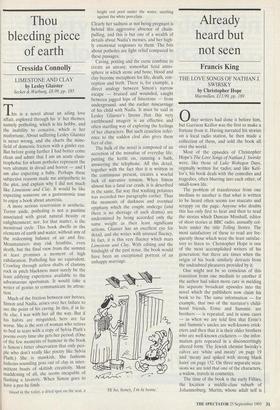Thou bleeding piece of earth
Cressida Connolly
LIMESTONE AND CLAY by Lesley Glaister Secker & Warburg, £8.99, pp. 185 his is a novel about an ailing love affair, explored through his 'n' her themes; namely potholing, which is his hobby, and the inability to conceive, which is her misfortune. About suffering Lesley Glaister is never wrong, and she charts the mine- field of domestic friction with a gimlet eye. But before going further I had better come clean and admit that I am an acute claus- trophobic for whom potholes represent the very ultimate in dread and horror — and I am also expecting a baby. Perhaps these subjective reasons made me antipathetic to the plot, and explain why I did not much like Limestone and Clay. It would be like expecting someone on a gastronomic tour to enjoy a book about anorexia.
A more serious reservation is aesthetic. Terror aside, potholing is not a pastime associated with great natural beauty or enlightenment; nor, for that matter, is the menstrual cycle. This book dwells in the elements of earth and water, without any of the redeeming balance of air and fire. Mountaineers may risk frostbite, even death, but the final view from the summit at least promises a moment of high exhilaration. Potholing has no equivalent. Crawling through airless shafts of clammy rock in pitch blackness must surely be the least edifying experience available to the adventurous sportsman. It would take a writer of genius to communicate its attrac- tion.
Much of the friction between our heroes, Simon and Nadia, arises over her failure to see the point of his caving. In this, if in lit- tle else, I was with her all the way. But if his habits are misguided, hers are far worse. She is the sort of woman who retires to bed in tears with a copy of Sylvia Plath's poems every time she gets her period. (One of the few moments of humour in the book is Simon's bitter observation that only peo- ple who don't really like poetry like Sylvia Plath.) She is mawkish. She fashions hideous-sounding pots out of clay in inter- mittent bouts of skittish creativity. Most maddening of all, she seems incapable of flushing a lavatory. When Simon goes to have a pee he finds
blood in the toilet, a dried spot on the seat, a bright red pool under the water, startling against the white porcelain.
Clearly her sadness at not being pregnant is behind this aggressive absence of chain- pulling, and this is but one of a wealth of details about Nadia's menses, and her high- ly emotional responses to them. The bits about potholes are light relief compared to these passages.
Caving, potting and the curse combine to create an uneasy, somewhat fetid atmo- sphere in which stone and bone, blood and clay become metaphors for life, death, con- ception and birth. There is, for example, a direct analogy between Simon's narrow escape — bruised and wounded, caught between jagged hips of limestone — from underground, and the earlier miscarriage of his child with Nadia. It must be said in Lesley Glaister's favour that this very earthbound imagery is an effective and often startling way of exploring the feelings of her characters. But such ceaseless refer- ence to the sodden clod also gives them feet of clay.
The bulk of the novel is composed of an accretion of the minutiae of everyday life: putting the kettle on, running a bath, answering the telephone. All this detail, together with the fact that it is written in the continuous present, creates a woeful lack of narrative tension. When Simon almost has a fatal car crash, it is described in the same, flat way that washing potatoes was recorded two paragraphs earlier. Thus the moments of darkness and eventual epiphany which the couple undergo (and there is no shortage of such drama) are undermined by being accorded only the same weight as their least significant actions. Glaister has an excellent eye for detail, and she writes with unusual fluency. In fact, it is this very fluency which mars Limestone and Clay. With editing and the hindsight of the past tense, the book would have been an exceptional portrait of an unhappy marriage.
'Hi ho, honey, I'm hi home.'


























































 Previous page
Previous page